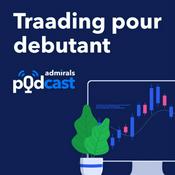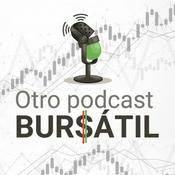97 episodios
- For the second time in a row, the Bank of Canada held the overnight interest rate at 2.25%.
The central bank made the decision citing that little had changed from its 2025 October Monetary Policy Report, so holding rates “remain appropriate” as Canada’s current economic outlook appears uncertain given the re-negotiation of the Canada-United States-Mexico Agreement (CUSMA) and evolving trade policies.
Scotiabank’s Chief Economist Jean-François Perrault is back on the podcast to break down the latest rate decision, what it could mean for Canadians and what we could see in the second half of the year.
For legal disclosures, please visit http://bit.ly/socialdisclaim and www.gbm.scotiabank.com/disclosures
Key moments for this episode:
1:12 – JF’s take on the main takeaway from the Bank of Canada’s latest decision
2:39 – JF on the current level of uncertainty and the challenge it poses
4:30 – How the Canadian economy has been “surprisingly resilient”
6:25 – The outlook for economic growth in 2026
7:51 – What is the “structural adjustment” that Canada is going through?
9:29 – What this all means for the average Canadian
10:49 – What does this mean for Canadians looking to buy a home or renew their mortgages?
12:57 – What are the takeaways for businesses?
14:20 – What are the main takeaways for Canadians from this decision? Former U.S. Open Tournament Director on empowering women in tennis and in business
20/1/2026 | 30 minAthletes like Billie Jean King or Serena and Venus Williams are known to even non-sports fans as iconic trailblazers when it comes to women’s tennis. But there’s another name, a Canadian, who spent a career off the court helping advance women in the sport and beyond: Stacey Allaster. Among her many accomplishments, she was instrumental in securing equal prize money for women, paving the way for the boom in professional women’s sports we’re seeing now. In partnership with the Scotiabank Women Initiative, Stacey is our guest this episode. She tells us the story behind getting that equal prize money, her insights on what it was like being a woman in a male-dominated industry and why it’s important to empower women on the tennis court, in the boardroom and beyond.
For legal disclosures, please visit http://bit.ly/socialdisclaim and www.gbm.scotiabank.com/disclosures
Key moments this episode:
1:57 – What it was like navigating male-dominated spaces throughout her career 4:36 – The significance of getting equal prize money for women in tournaments like Wimbledon and Roland-Garros 10:12 – What this historic accomplishment taught Stacey about leadership 11:51 – With the expansion of leagues like the PWHL and the WNBA, is women’s sports having a moment right now? 15:26 – Why people still have to go the extra mile to make the business case for women’s sports despite the success we’ve seen 17:38 – Why Stacey also finds it important to empower women off the court in fields like finance and business leadership 21:09 – Stacey talks about her early days at Tennis Canada and the impact it had on her 23:35 – The key factor Stacey learned that can help women succeed in business 24:25 – Stacey tells us what’s next for her as she plans to ‘hang up her full-time racket’ 27:00 – Stacey highlights some of her favourite tennis moments from her career- In this episode, we're helping investors gear up for 2026 by looking back at 2025. From trade uncertainty to a lesson on headlines versus reality, to AI, Yuko Girard, Vice President and Portfolio Manager on the Multi Asset Management Team at Scotia Global Asset Management, breaks down the last 12 months and gives us some tips for the year ahead.
For legal disclosures, please visit http://bit.ly/socialdisclaim and www.gbm.scotiabank.com/disclosures
Key moments this episode:
00:10 — Yuko’s one word to sum up 2025 when it came to investing 1:08 — The overarching lesson investors can best take away from 2025
2:30 — How did tariffs and U.S. relations affect investing in 2025 and what lesson can investors take into the new year?
6:36 — How everyday investors can spot the difference between short-term panic and a deeper market correction
8:52 — What lesson can investors take into 2026?
10:57 — How did AI factor in for investors in 2025?
13:19 — What are the main lessons when it comes to volatility that investors can take from 2025 going into 2026?
14:04 — How should investors approach rebalancing portfolios after a market swing?
16:07 — Why diversification is increasingly important
16:43 — One surprising trend that investors should watch for in 2026
17:30 — The main takeaway from 2025 and one key theme for 2026 - The Bank of Canada has held its key policy interest rate at 2.25% after two consecutive cuts.
The central bank’s decision was widely expected and comes as the Canadian economy remains resilient despite tariffs on certain sectors, such as steel and aluminum, and ongoing trade uncertainty.
Scotiabank’s Chief Economist Jean-François Perrault is back on the podcast to break down the latest rate decision, why the economy has remained relatively strong, his outlook for rate decisions in 2026, and much more.
For legal disclosures, please visit http://bit.ly/socialdisclaim and www.gbm.scotiabank.com/disclosures
Key moments this episode:
1:02 – What’s the main takeaway from the Bank of Canada’s decision?
1:27 – What’s going on in the economy that led the central bank to hold the rate steady at 2.25%?
3:58 – Can you help explain why the Canadian economy has remained resilient, despite the events of the last eight months or so?
7:05 – JF’s outlook for 2026
8:45 – How does JF see inflation progressing over the next few months, given government spending and fiscal policy over the next year. What impact could that have?
12:39 – Will food and housing continue to contribute to driving up the cost of living?
14:40 – JF explains why interest rates may rise again in the second half of 2026
17:20 – What impact does the Bank of Canada’s decision to hold now have on Canadians? With a potential rate increase in six months, what does that mean for those looking to buy big-ticket items?
19:22 – What impact does this decision have for businesses?
19:44 – What impact does the U.S. Federal Reserve’s rate decision have on Canada?
22:00 – What are the main takeaways for Canadians from today’s decision? 23:10 – Co-host Armina Ligaya joins us for a big announcement about the Perspectives podcast - In this episode, we walk through the ins and outs of modern-day philanthropy with Jacqui Allard, the Group Head of Global Wealth Management and co-executive sponsor of Scotiabank’s Employee Giving Campaign. She has tips on how to simplify and maximize donations, how to figure out where to give, how giving can factor into estate planning at any level and more.
For legal disclosures, please visit http://bit.ly/socialdisclaim and www.gbm.scotiabank.com/disclosures
Key moments this episode:
1:14 – The role charitable giving has played in Jacqui’s life and the three pillars that are important to her when it comes to philanthropy
2:53 – What Jacqui would say to someone who might say, ‘I’m not wealthy, how can I think about giving?’
3:32 – Why it’s important to give
4:03 – How people should decide where to give their money or time
4:57 – Tips of making regular giving easier
6:55 – How philanthropy can play into overall wealth planning
8:57 – The role charitable giving can factor into estate planning
9:37 – Jacqui tells us about the Scotiabank Employee Giving campaign
11:28 – The key takeaway from this discussion
Más podcasts de Economía y empresa
Podcasts a la moda de Economía y empresa
Acerca de Perspectives
Each episode we help break down the important economic issues on Canadians’ minds. With our unique access to leading experts, timely insights and helpful explainers, we navigate the latest in the world of finance, housing, business, the markets — and more.
For legal disclosures, please visit http://bit.ly/socialdisclaim and www.gbm.scotiabank.com/disclosures
Sitio web del podcastEscucha Perspectives, The Diary Of A CEO with Steven Bartlett y muchos más podcasts de todo el mundo con la aplicación de radio.net
Descarga la app gratuita: radio.net
- Añadir radios y podcasts a favoritos
- Transmisión por Wi-Fi y Bluetooth
- Carplay & Android Auto compatible
- Muchas otras funciones de la app
Descarga la app gratuita: radio.net
- Añadir radios y podcasts a favoritos
- Transmisión por Wi-Fi y Bluetooth
- Carplay & Android Auto compatible
- Muchas otras funciones de la app

Perspectives
Escanea el código,
Descarga la app,
Escucha.
Descarga la app,
Escucha.





































